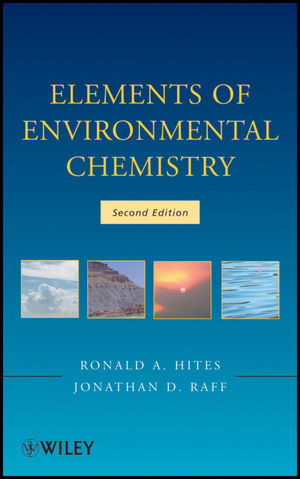
Elements of Environmental Chemistry
John Wiley & Sons Inc (Verlag)
9781118041550 (ISBN)
- Titel erscheint in neuer Auflage
- Artikel merken
Ronald A. Hites, PhD, is a Distinguished Professor in the School of Public and Environmental Affairs at Indiana University. He is a Fellow of the American Chemical Society and of the American Association for the Advancement of Science. He has been an editor of Environmental Science and Technology since 1990. Jonathan D. Raff, PhD, is an Assistant Professor in the School of Public and Environmental Affairs at Indiana University. He was the recipient of a National Science Foundation American Competitiveness in Chemistry Postdoctoral Fellowship and a United States Environmental Protection Agency STAR Graduate Fellowship.
1. Simple tool skills 1 1.1 Unit conversions 1 1.2 Estimating 5 1.3 Ideal gas law 9 1.4 Stoichiometry 14 1.5 Problem set 16 2. Mass balance and kinetics 23 2.1 Steady-state mass balance 23 2.2 Non-steady-state mass balance 42 2.3 Chemical kinetics 59 2.4 Problem set 70 3. Atmospheric chemistry 77 3.1 Atmospheric structure 77 3.2 Light and photochemistry 80 3.3 Atmospheric oxidants 86 3.4 Kinetics of atmospheric reactions 88 3.5 Stratospheric ozone 91 3.6 Smog 105 3.7 Problem set 112 4. Climate change and greenhouse effect 123 4.1 Historical perspective 123 4.2 Blackbody radiation and Earth s temperature 125 4.3 Absorption of infrared radiation 130 4.4 Greenhouse effect 132 4.5 Earth s radiative balance 134 4.6 Aerosols and clouds 138 4.7 Radiative forcing 141 4.8 Global warming potentials 142 4.9 Concluding remarks 144 4.10 Problem set 146 5. Carbon dioxide equilibria 153 5.1 Pure rain 155 5.2 Polluted rain 160 5.3 Surface water 169 5.4 Ocean acidification 174 5.5 Problem set 181 6. Pesticides, mercury, and lead 189 6.1 Pesticides 191 6.2 Mercury 210 6.3 Lead 213 6.4 Problem set 217 7. Fates or organic compounds 223 7.1 Vapor pressure 225 7.2 Water solubility 226 7.3 Henry s Law constant 226 7.4 Partition coefficients 228 7.5 Lipophilicity 228 7.6 Bioaccumulation 231 7.7 Adsorption 232 7.8 Water-air transfer 234 7.9 Reactive fates of organic chemicals 240 7.10 Partitioning and persistence 242 7.11 Problem set 247 8. PCBs, dioxins, and flame retardants 257 8.1 Polychlorinated biphenyls (PCBs) 257 8.2 Polychlorinated dibenzo-p-dioxins and dibenzofurans 275 8.3 Brominated flame retardants 294 8.4 Lessons learned 301 A. Primer on organic structures and names 305 B. Answers to the problem set 323 C. Periodic table of the elements 326 Index 329
| Verlagsort | New York |
|---|---|
| Sprache | englisch |
| Maße | 162 x 207 mm |
| Gewicht | 470 g |
| Themenwelt | Naturwissenschaften ► Biologie ► Ökologie / Naturschutz |
| Naturwissenschaften ► Chemie | |
| Naturwissenschaften ► Geowissenschaften ► Geologie | |
| Technik ► Umwelttechnik / Biotechnologie | |
| ISBN-13 | 9781118041550 / 9781118041550 |
| Zustand | Neuware |
| Informationen gemäß Produktsicherheitsverordnung (GPSR) | |
| Haben Sie eine Frage zum Produkt? |
aus dem Bereich



